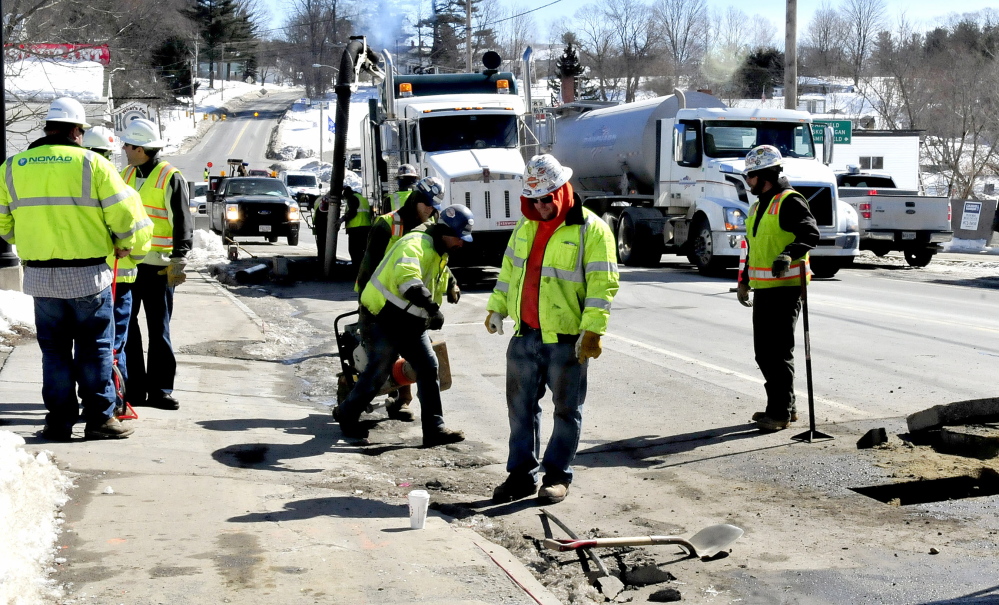A multimillion-dollar dispute between the natural gas pipeline company doing the Kennebec Valley Pipeline Project and its major contractor is likely to go to a trial before a judge.
Magistrate Judge John Nivison has recommended that most of the claims between Summit Natural Gas of Maine Inc. and Schmid Pipeline Construction Inc., continue, rejecting a motion for summary judgment.
That recommendation came this week in U.S. District Court in Bangor. Both sides have a chance to file objections, and the case then will go to District Court Judge George Z. Singal, who can accept, reject or modify the recommendation to send it to trial.
“We’re fully prepared to go forward in terms of a bench trial and have a fact-finder make a determination on the issues outlined in Judge Nivison’s opinion,” John Hobson, one of Schmid’s attorneys, said on Friday.
Hobson said Schmid is seeking almost $72 million plus interest, costs and attorney fees, plus fees under the prompt payment act. About $35 million paid directly by Summit to Schmid’s subcontractors would be deducted from that, Hobson said.
“My client’s policy is not to comment on pending litigation matters,” said A. Robert Reusch, one of Summit’s attorneys, in a reply to an emailed query. “We will not, therefore, be commenting on the Magistrate’s decision issued earlier this week.”
Schmid sued Summit for $72 million in damages in December 2013, saying Summit had breached its contract with the company and underestimated the scope of necessary work on the pipeline network. As a result, Schmid said it had to increase the number of workers and their working hours while providing more in materials and equipment without Summit increasing their payments.
Summit filed counterclaims against Schmid, alleging breach of contract, breach of warranty and other claims.
Nivison’s written recommendation outlines some of the contract negotiations, including a discussion in which Schmid declines to work on a unit-price basis and instead proposes to bill for “labor, equipment, materials and subcontractor costs on a time and materials basis.”
An April 2013 proposal by Josh Purrenhage, Schmid’s vice president of operations, says, “By reducing our profit on this project, we believe we can install the 353,500 (linear feet) of pipe for a budget of approximately $61 million inclusive of 10 percent contingency.”
By late October 2013, after construction had been underway for some months and the contract amended several times, Schmid informed Summit the projected final cost would be about $120 million.
Nivison lists the claims in the dispute, in which Schmid says Summit had little experience in pipeline construction, and Summit says Schmid’s key personnel were absent from Maine for about half the construction season.
Schmid also says it learned that there were many more utility crossings than initially estimated and that it had to hire more people to stay on schedule.
Schmid quit work on the project on Nov. 20, 2013, saying that Summit had refused to reimburse Schmid for about $64 million in capital outlay.
The documents show Schmid included markups for idle time and union-scale wages.
Also, Summit has paid more than $100 million for Schmid’s work, including more than $35 million directly to Schmid subcontractors.
Schmid says Summit breached the contract and violated a state prompt payment law, among other claims. Summit, in counterclaims, says Schmid breached the contract by failing to manage performance and control costs, by halting work abruptly and by doing deficient work.
Schmid sought summary judgment on the breach of contract and prompt payment claim.
Nivison recommended refusal, saying, “The factual record includes evidence from which a fact finder could conclude that some of Schmid’s work was deficient or performed inefficiently, and that Schmid billed incorrectly for some of the subcontract work. He also said the prompt payment claim “is properly left for the trial.”
Nivison recommended rejection of Summit’s claim against Schmid for unjust enrichment, saying, “(T)he parties agreed to a specific rate that was acceptable to both parties and that was not dependent on Schmid realizing a certain profit.”
Objections to Nivison’s recommendations and requests for oral argument must by made by July 13.
In the meantime, construction of the pipeline has continued with other contractors. Information on where the construction is taking place is available online through Summit’s website at summitnaturalgasmaine.com/service-areas.
As of January 2015, the company reported having about 3,000 residential, commercial and industrial customers under contract for natural gas delivery in 12 cities and towns in central and southern Maine, according to a news release Summit distributed in May.
Betty Adams — 621-5631
Twitter: @betadams
Send questions/comments to the editors.



